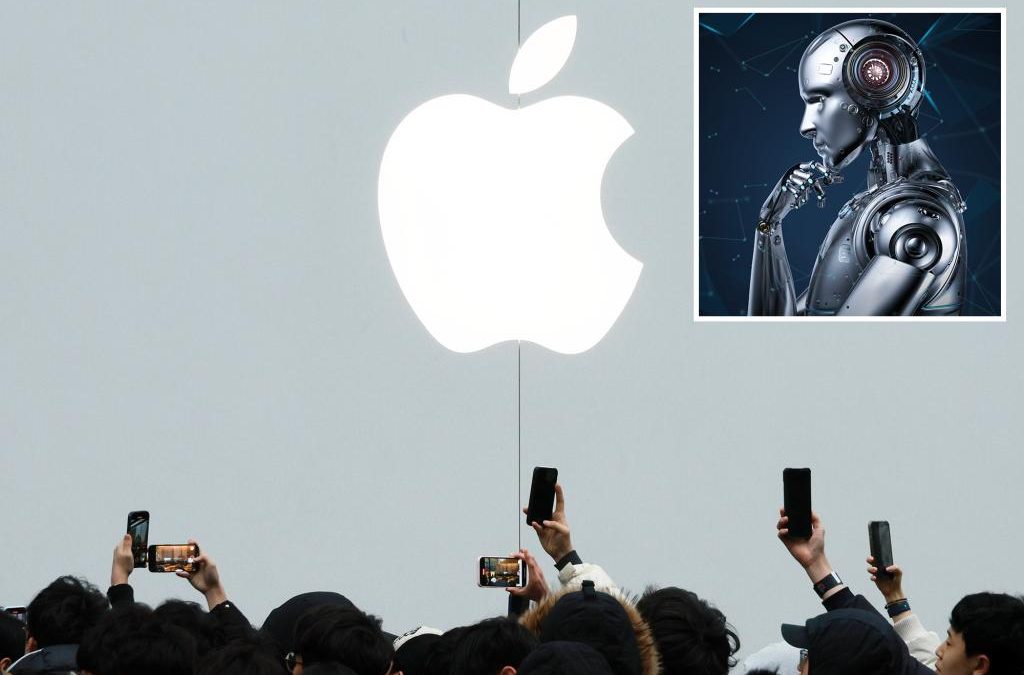Apple has been steadily pouring resources into the pursuit of advanced intelligence products – and the tech giant is reportedly planning to integrate the features into future versions of its iPhones.
The Cupertino, Calif.-based company has acquired a whopping 21 AI startups since 2017, the Financial Times reported, citing PitchBook data.
More transactions could be on the way.
“They are getting ready to do some significant M&A,” Wedbush analyst Daniel Ives told the outlet. “I’d be shocked if they don’t do a sizable AI deal this year, because there’s an AI arms race going on, and Apple is not going to be on the outside looking in.”
Additionally, Apple has stepped up efforts to hire employees with expertise in “deep learning” – a reference to models that power advanced AI systems.
Nearly half of all AI-related Apple job postings include the phrase, Morgan Stanley analysts said in a research note cited in the article.
Insiders reportedly believe that Apple is looking for ways to add generative AI features that can run on iPhones and other portable devices Instead of through cloud computing networks.
Morgan Stanley analysts predict that Apple could unveil key details as soon as its Worldwide Developers Conference in June, when the company is expected to detail generative AI features included in the new version of iOS, its mobile operating system.
The analysts said Apple’s voice assistant Siri could receive an AI-related upgrade.
The Cupertino, Calif.-based company also has been “working on its own large language models” to compete with those offers by tech rivals such as OpenAI and Google, the FT reported, citing industry insiders.
The outlet also pointed to Apple’s release of more powerful computing chips for hardware devices which appear to be geared toward the greater requirements for AI processing.
Apple did not immediately return a request for comment.
Needham analyst Laura Martin said AI developments would be crucial for Apple as it looks to “protect their installed base” of hardware devices, which still comprise the bulk of the company’s revenue.
“Apple doesn’t want to be in the business of what Google and Amazon want to do, which is to be the backbone of all American businesses that build apps on large language models,” Martin told the FT.
CEO Tim Cook referenced the company’s efforts during an earnings call last November, telling analysts that Apple was “investing quite a bit” into AI and was developing the technology “responsibly.”
“In terms of generative AI, obviously, we have work going on,” Cook said last November. “I’m not going to get into details about what it is, because as you know, we really don’t do that. But you can bet we’re investing.”
Last summer, Bloomberg reported that Apple had begun testing “Apple GPT” as part of its bid to catch up to other Big Tech rivals.
Elsewhere, Apple has reportedly engaged in negotiations with news publishers about potentially licensing their articles to help train its large-language models.
Apple isn’t the only tech giant looking to build an AI-centric phone.
OpenAI CEO Sam Altman has teamed up with former Apple design guru Jony Ive to build AI devices – and even reportedly poached Apple’s iPhone design boss to assist the effort.
While Apple is pouring resources into AI, another key project is reportedly taking a backseat for the time being.
Apple has delayed the planned release of its self-driving vehicle to 2028 at the earliest, Bloomberg reported.
Rather than a “driverless car,” the vehicle is now epected to be “an electric vehicle with more limited features.”
Source




